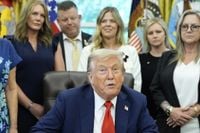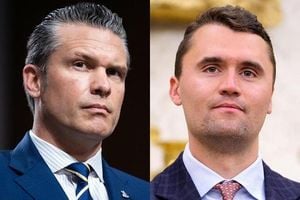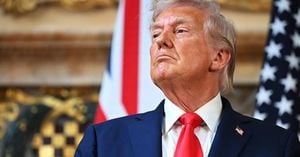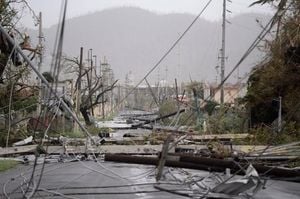Four years after the devastating bombing at Abbey Gate during the U.S. withdrawal from Afghanistan, President Donald Trump marked the anniversary on August 25, 2025, with a solemn ceremony at the White House. Surrounded by Gold Star families—those who lost loved ones in the attack—Trump signed a proclamation designating August 26 as a day of remembrance, honoring the 13 American service members who lost their lives and the many others affected by the tragedy. The event, attended by Vice President JD Vance and Defense Secretary Pete Hegseth, was as much about commemoration as it was about accountability, with the shadow of the chaotic withdrawal and its political ramifications looming large.
The Abbey Gate bombing on August 26, 2021, was a suicide attack at Hamid Karzai International Airport in Kabul, occurring during the frantic evacuation of U.S. and allied personnel as the Taliban rapidly seized control of Afghanistan. The blast killed 13 U.S. service members—11 Marines, one Army Staff Sergeant, and one Navy Hospital Corpsman—and wounded approximately 32 others. It also claimed the lives of more than 170 Afghan civilians, making it one of the deadliest days in recent U.S. military history. According to Fox News, Trump described the day as "one of the darkest in our Nation's history," and pledged, "We will never forget you; we will never forsake you; and your memory will live on forever."
The ceremony in the Oval Office was deeply personal for the families present. Trump addressed them directly, saying, "There are some great souls that are looking down on you right now, and they’re very proud of their parents, and brothers, and sisters, and moms and dads especially. That’s what I seem to have dealt with mostly." He continued, "They went through hell for no reason. It should have never happened." The pain was palpable, but so was the resolve to ensure their loved ones' sacrifices would not be forgotten.
Vice President JD Vance, himself a Marine veteran, echoed the sentiment, telling the families, "The fact that the President of the United States lost your loved ones through incompetence, but never acknowledged it in your government, never actually put pen to paper to say we're grateful for your sacrifice… Today, we correct that injustice." The event was, as Vance described it, "a rectification of a wrong."
The proclamation signed by Trump was unflinching in its criticism of the Biden administration's handling of the withdrawal. It called the operation "the single most embarrassing display of American foreign policy in the history of our country," and accused President Joe Biden of overseeing a "reckless political stunt" that left U.S. forces without a defensible base and allowed the Taliban to free thousands of prisoners from Bagram prison. Defense Secretary Pete Hegseth, who stood alongside Trump and the families, announced that the Pentagon is conducting a new, thorough investigation into the withdrawal, with results expected by mid-2026. "We're going into everything to get an understanding of what happened," Hegseth said, emphasizing the depth of the review.
The political overtones of the ceremony were unmistakable. Trump and his allies have repeatedly used the Abbey Gate bombing as a symbol of what they argue was a historic failure of leadership by Biden and Vice President Kamala Harris. Trump visited Arlington National Cemetery in 2024 to mark the third anniversary of the withdrawal, and the families have formed the Abbey Gate Coalition, working with Trump to raise awareness and push for accountability. The coalition even spoke at the 2024 Republican National Convention, highlighting the attack's enduring resonance in American political discourse.
Yet, the Biden administration and its supporters have pushed back, arguing that the Trump administration left them with an untenable situation and that Biden made the difficult, but necessary, decision to end a war that had dragged on for two decades. The withdrawal, they contend, was the culmination of plans set in motion during Trump's first term, when negotiations with the Taliban aimed to bring U.S. involvement in Afghanistan to a close. Despite these justifications, the rapid collapse of the Afghan government and the chaos at Kabul airport—including the Abbey Gate bombing—have remained a persistent source of criticism and debate.
The attack's perpetrators have also faced justice, according to statements from the Trump administration. Abdul Rahman al Logari was identified as the suicide bomber, while Mohammad Sharifullah, who aided him, was captured by Pakistani authorities and extradited to the United States in March 2025. The capture and extradition of Sharifullah were announced by Trump shortly after the start of his second term, underscoring his administration's commitment to pursuing those responsible.
The 13 American service members killed in the attack were: Lance Cpl. David Espinoza, Sgt. Nicole Gee, Staff Sgt. Darin Taylor Hoover, Cpl. Hunter Lopez, Lance Cpl. Dylan R. Merola, Lance Cpl. Rylee McCollum, Lance Cpl. Kareem Nikoui, Cpl. Daegan William-Tyeler Page, Sgt. Johanny Rosario Pichardo, Cpl. Humberto Sanchez, Lance Cpl. Jared Schmitz, Army Staff Sgt. Ryan Knauss, and Navy Hospital Corpsman Maxton Soviak. Their names were read aloud during the ceremony, their families honored not just for their sacrifice, but for their continued advocacy and resilience.
The aftermath of the Abbey Gate bombing has also sparked broader geopolitical concerns. Defense Secretary Hegseth claimed that the attack convinced Russian President Vladimir Putin of U.S. military incompetence, influencing his decision to invade Ukraine. While such assertions remain contentious, they highlight the far-reaching implications of the withdrawal and its perceived impact on global power dynamics.
Pentagon spokesman Sean Parnell, himself an Afghanistan veteran, is leading the new investigation into the Abbey Gate attack. The review aims to address lingering questions about the withdrawal's execution and to provide answers for the families who continue to seek accountability. As Hegseth put it, "America deserves answers as far as what happened in Afghanistan. The military needs to answer for what happened in Afghanistan."
For the Gold Star families, the anniversary was a moment of both grief and recognition. Trump assured them, "We're so proud of you and we're so proud of your loved ones for giving their lives for our country." The proclamation, and the ceremony itself, served as both a tribute and a promise: that the memory of the 13 fallen patriots would endure, and that their sacrifice would not be in vain.
As the nation reflects on the events at Abbey Gate, the ceremony at the White House stands as a powerful reminder of the costs of war, the weight of leadership, and the enduring need to honor those who serve.





